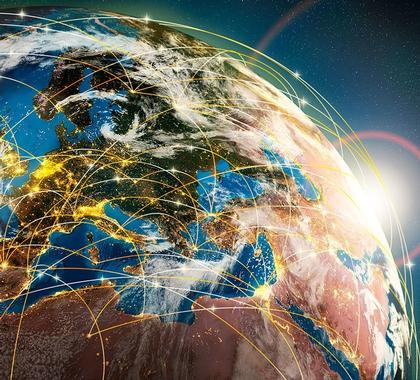Economic freedom in the United States increased in the past year as a result of tax cuts and deregulation, the 2019 Index of Economic Freedom reports.
The United States jumped six spots in the global rankings, from number 18 to number 12. Canada, at number 8, was the only country in the Americas ranked higher than the United States.
Worldwide, economic liberty declined for the first time in six years, the study found. The global economy was “moderately free” in 2018, according to the report, which is produced annually by The Heritage Foundation and was released in January.
The index rates 180 countries on a 100-point scale of economic freedom in four areas—rule of law, government size, regulatory efficiency, and open markets—using publicly available data. It then ranks the nations by score.
Globally, Freedom Declined
On the 100-point scale, the world average score of 60.8 is a 0.3-point setback from last year, states a Heritage Foundation press release about the index. That global average score is still the third-highest in the 25-year history of the index.
Among the 180 countries analyzed, scores improved for 81 countries and declined for 92. Seven remained unchanged.
The Index rates the six economies that scored above 80 as “free,” and the next 88 countries are classified as “mostly free,” with scores of 70 to 79.9, or “moderately free,” with scores of 60 to 69.9.
Sixty-four economies were classified as “mostly unfree,” with scores of 50 to 59.9, and 22 are “repressed,” with scores below 50.
U.S. Score Rises
The United States continued to improve its standing, recording a score of 76.8, more than a full point above its score in the 2018 Index.
The Trump administration is responsible for the boost in the United States’ ranking, says Anthony Kim, a coeditor of the index.
“The 2017 tax cuts played a huge role,” said Kim. “The economy is booming, and unemployment is at record lows. Small business optimism is high.
“These numbers don’t come out of nowhere; policies enacted by the Trump administration, like tax cuts and deregulation, created them,” Kim said.
Characteristics of Free Economies
The economies rated as free—Hong Kong, Singapore, New Zealand, Switzerland, Australia, and Ireland—have certain things in common, Kim says.
“They share strong commitments to upholding the rule of law, limited government, regulatory efficiency, and market openness,” Kim said.
“These four principles are the key to lasting economic development and dynamism,” Kim said. “The U.S. economy has been regaining its economic freedom and competitiveness, but we can do more and better, for sure. We should be cautiously optimistic.”
Objective Measures
Edward Hudgins, research director for The Heartland Institute, which publishes Budget & Tax News, says he developed the Index of Economic Freedom when he worked at the Heritage Foundation in the 1980s.
“I developed the concept for the Index of Economic Freedom and laid its foundations to measure, by objective standards, how economically free or unfree countries are,” Hudgins said.
“This Index allows us to demonstrate, with no uncertainty, that economically free countries prosper and those with little freedom wallow in poverty,” Hudgins said.
U.S. Ups and Downs
The United States has risen and fallen in the rankings in line with political changes, Hudgins says.
“In 1995 its score was 76.7 out of 100, and it climbed to 81.2 by 2006-7,” Hudgins said. “Then came the statist policies of the Obama years when the score dropped to 75.4.
“Because of tax cuts and deregulation by the Trump administration, the United States has moved up on the Index to 76.8 and its economy is booming,” Hudgins said.
Economic Illiteracy
The decline in understanding of economics, and therefore declining support for freedom among many Americans, is the most troubling ‘score’ to him, says Hudgins.
“Benjamin Franklin said, ‘Those who would give up essential Liberty, to purchase a little temporary Safety, deserve neither Liberty nor Safety,'” Hudgins said. “I would add ‘a little temporary prosperity,’ through government programs that limit liberty but promise a special handout or favor.”
In the end, limiting liberty makes people poorer, Hudgins said.
“Freedom leads to property because it unleashes the creative spirit of individuals who pursue their own well-being by providing goods and services to willing customers,” Hudgins said.
Liberty and Prosperity
Liberty is a precondition for prosperity, Hudgins says.
“Hong Kong and Singapore, always at the top of the Index list, are the best examples of countries that allowed the maximum economic freedom and went from impoverished to among the richest in the world,” Hudgins said.
“Unfortunately, many countries today are slipping,” Hudgins said. “Most notably, many Western, developed countries have bought into global warming hysteria and are inflicting serious harm on their economies with more regulations restricting low-cost and reliable fossil fuels and nuclear power, all to solve a non-problem.”
The United States should heed Western Europe’s economic decline as a warning, Hudgins says.
“If the U.S. wants a strong economy in the future, it should not only reject climate alarmism but also use the Index to guide it toward more freedom across the economy and, therefore, greater prosperity,” Hudgins said.
Ashley Herzog ([email protected]) writes from Avon Lake, Ohio.
Internet Info:
Terry Miller, Anthony B. Kim, and James M. Roberts, eds., 2019 Index of Economic Freedom, The Heritage Foundation, Jan. 25, 2019: https://heartland.org/publications-resources/publications/index-of-economic-freedom-2019




